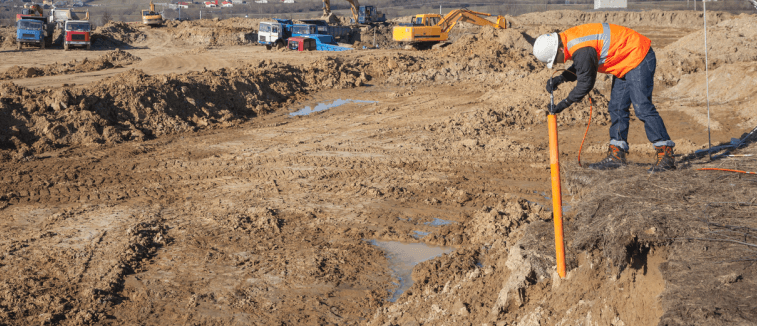Geotheta Fundamentals Explained
Geotheta Fundamentals Explained
Blog Article
The Geotheta PDFs
Table of ContentsOur Geotheta StatementsThe 6-Second Trick For Geotheta10 Easy Facts About Geotheta ExplainedThe Basic Principles Of Geotheta All about Geotheta

With experience and a tried and tested track record, you can proceed to senior design roles, task management placements, or perhaps begin your very own consultancy. Constant professional advancement and remaining updated with the most up to date market fads and innovations are important for occupation development in this dynamic field. A job in geotechnical engineering supplies a diverse variety of projects and difficulties, making certain that no two days are the exact same.
In the workplace, you will examine information, prepare records, and collaborate with other specialists - https://geotheta.webflow.io/. Fieldwork entails website gos to, accumulating dirt samples, performing geotechnical investigations, and looking after building tasks. Depending upon the project, you might work on-site in varying climate condition and take a trip to different places within the UK. As a geotechnical designer, your tasks might consist of site characterization, incline stablizing style, structure engineering, soil renovation techniques, and geotechnical instrumentation and surveillance.
The smart Trick of Geotheta That Nobody is Talking About
You will also communicate with clients, specialists, and regulative authorities to attend to any kind of problems and make certain conformity with industry standards and policies. Geotechnical engineering can be challenging, as it involves dealing with complex soil conditions and resolving possible risks to human life and infrastructure. Nevertheless, successfully solving geotechnical problems and adding to the advancement of risk-free and sustainable structures can be tremendously rewarding.
If you're taking into consideration an occupation in geotechnical engineering, below are some important tips to aid you accomplish success: Networking is important for career innovation in any type of field, and geotechnical design is no exemption. Joining specialist associations, such as the Establishment of Civil Engineers (ICE) and the British Geotechnical Organization (BGA), can supply networking opportunities, accessibility to industry occasions and seminars, and beneficial resources for specialist advancement.

Creating strong interpersonal and administration abilities will certainly set you apart and open doors to occupation development possibilities - https://www.ted.com/profiles/47432098. Beginning on an occupation as a geotechnical engineer in the UK offers amazing prospects and the possibility to add to the development of the constructed environment. By complying with the educational pathways, getting necessary licenses and qualifications, and continuously refining your skills, you can develop an effective career in this dynamic area
The 10-Minute Rule for Geotheta
When a person asks what I do and I inform them that I am a geotechnical engineer, I normally obtain the follow-up inquiry of, "What is that?" Geotechnical design is a specialized branch of civil engineering that handles the science of the auto mechanics of dirt and rock and its applications.
In this write-up, I will discuss the function of geotechnical design and the types of problems geotechnical engineers resolve. Geotechnical engineers (geotechs) are included in almost every sort of civil engineering project. Besides, every structure is supported by soil or rock unless it is drifting, flying, or falling down.
Geotechs are usually most entailed at the start of a job. A few of the tasks that a geotech may be responsible for are examining subsurface conditions, identifying needed lab screening of dirt and rock, translating the subsurface exploration results, and creating records that document the website problems and supply suggestions for foundations, fill specifications, incline stability, etc.
Often, people do not want to pay for geotechnical reports or design on smaller jobs, however the expense of a professional is typically more affordable than paying for comprehensive foundation repairs in the future. Geotechs are associated with the design of highway cuts and loads, superficial and deep structures, earth keeping structures, embankments, tunnels, land fills, dams, incline stabilization systems, and pavement subgrades.
The Main Principles Of Geotheta

Oftentimes, points that may not appear important end up being important years later on when concerns develop. Geo Tech Engineer. One last point to keep in mind: geotechnical design is married to geology. Regardless of just how terrific your design competence is, if something important is missed in the geologic characterization at a site, your expertise may not conserve you
Vance, P.E., finished from Marshall University with a Bachelor of Science in Design and obtained a Master of Science in Civil Engineering from the College of Illinois at Urbana-Champaign. He is currently functioning toward a Ph. D. in Geological Engineering at Missouri University of Scientific Research and Modern technology. Jese works as a geotechnical engineer who focuses on geohazards.
Not known Facts About Geotheta
Jese lives in West Virginia with his wife and son. He takes pleasure in crawling about on visit the site any kind of landslide he can discover and spending time fly fishing on the water. I wish you appreciated this week's article by visitor author Jese Vance.
Anthony Fasano, P.E.Engineering Administration Institute Author of Engineer YourOwn Success. Civil design is the expert engineering discipline that manages the layout, construction and maintenance of public and exclusive facilities within the native environment. Geotechnical design is a self-control within civil engineering that concentrates on the habits of natural geological materials in engineered systems. Geotechnical designers acknowledge that dirt and rock are the most inexpensive and most plentiful building products on Earth, and subsequently play a significant function in the building and efficiency of every type of civil design framework.
Report this page